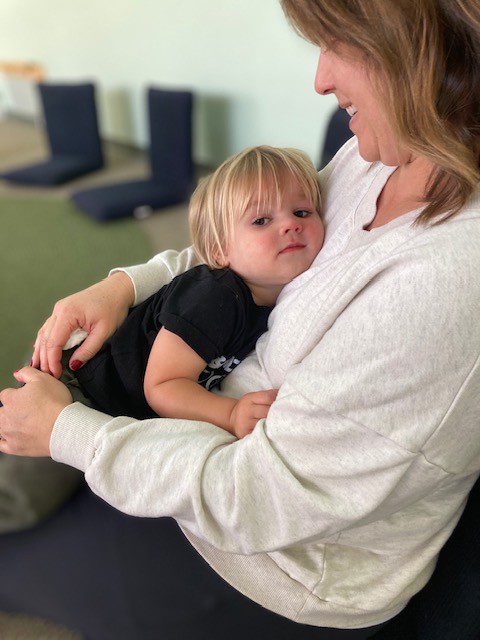Mindful Parenting in the Digital Age
by Jessica Donahue, B.S., B.A. Human Development: Early Childhood Development, Counseling Psychology Graduate Student, Secure Beginnings Facilitator.
Digital devices and technology have become interwoven into the fabric of our everyday lives. This technology enables us to communicate, collaborate, create, store, share, and learn with greater ease and speed.
Today, babies are born into a world where their parents/caregivers can be “plugged in” and “digitally connected” at any moment of the day or night, which can create interruptions in human connection, routines, and caregiving activities.
These interruptions are also known as technoference. Technoference is defined as the everyday interruptions in parent-child interactions and routines due to digital devices (Barr et al., 2018). Young children are particularly vulnerable to the potential impact of technoference (Barr et al., 2018; Coyne et al., 2017).
Awareness of the drawbacks of technoference invites adults to be mindful about the effects that digital devices have on the developing child. This includes parental digital device use while in the presence of young children which may result in a decrease in responsive parent-child interactions, interrupting important opportunities for emotional connection. These interactions are the foundation of secure parent-child relationships.
This quote from Magda Gerber references the value of giving our full attention to children during caregiving times:
“What an infant needs–what every human being wants–is to experience the full undivided attention of a parent or other significant person. But nobody can pay full attention all of the time … Take the phone off the hook before you intend to feed, bathe, or diaper your baby…” (2002, p. 5).
I remember a time that I held my 19-month-old son on my hip with my left arm wrapped around him. In my free right hand I held my cellphone on which my attention was fixed. While I can no longer recall what had intensely captured my focus, I will never forget the feeling of my son’s small hands as they reached for my face and firmly directed my attention towards his face. Our eyes locked. His bid for connection was clear. I put my phone down. I wish that I could say that I was less distracted during our time together or that I no longer used such devices in his presence, but I settled for being more disciplined and intentional around my use.

Research has also shown that parent/caregiver mental health challenges increase with the use of devices. Digital fatigue, sleep disturbances, decreased sense of well-being, anxiety and depression have all been reported. It might be useful to explore your use of media and notice what thoughts, sensations, or feelings you have.
To mitigate negative effects of digital overwhelm, it can be helpful to:
- set clear boundaries by following a schedule of on/off times
- set healthy limits for yourself
- create a healthy digital environment by selecting quality sources you trust
- use media purposefully, post mindfully
- build digital detox/media-free times into your routine
We recognize that parenting in our digital age has also provided valuable opportunities for learning and support. Parents now have easy access to information and resources on all things related to raising children. The vast number of resources can be both comforting, supportive, or helpful, and at times anxiety-producing and overwhelming. Additionally, information can be conflicting or inaccurate.
Given that the internet provides so much parenting information to sift through, we are providing a few of our favorite resources for adults. These align with the Secure Beginnings mission and values of nurturing secure attachment and healthy relationships for families with children ages zero to five. They all provide some free and low-cost education for caregivers and professionals.
Hand in Hand Parenting is a nonprofit organization that provides resources and supportive communities for families and professionals, intended to promote connection during challenging times. The Hand in Hand Parenting Approach emphasizes connection-based strategies including Special Time, Staylistening, Playlistening, Listening Partnerships, setting limits, and more. The strategies help build resilient families and communities.
Resources for Infant Educarers (RIE) is a nonprofit organization that promotes a model of care and education for infants and toddlers, based on world-renowned child and infant therapist Magda Gerber’s Educaring Approach. The Educaring Approach is a framework for building a relationship through caregiving activities in which the child is encouraged to participate. The basis of Educaring is respect demonstrated through full attention in everyday interactions, sensitive observation, predictability, and a safe environment. The goal of the Educating Approach is an authentic child: “one who feels secure, autonomous, competent, and connected.”
The National Association for the Education of Young Children (NAEYC) is a nonprofit professional organization that is dedicated to ensuring that all young children thrive and reach their full potential. NAEYC promotes high-quality early learning that connects research, policy, and practice for both parents/caregivers and professionals, providing research-based resources, tips and ideas for caregivers of young children.
Janet Lansbury is a RIE Associate and author of best-selling parenting books, Elevating Child Care: A Guide to Respectful Parenting and No Bad Kids: Toddler Discipline Without Shame. Janet Lansbury shares her personal and professional experience as well as tips and education for parents on her website, social media, and on her podcast, Respectful Parenting: Janet Lansbury Unruffled.
ZERO TO THREE is a nonprofit organization that recognizes the importance of a child’s earliest connections and experiences. ZERO TO THREE supports adults caring for young children with knowledge of early development and tools to promote the well-being of toddlers and infants. This support is based on brain science and ample research that supports how emotionally nurturing relationships lay the foundation for lifelong health and well-being.
Attachment Nerd by Eli Harwood, a mother, therapist, and author of the book Securely Attached. Eli Hardwood posts research-based tips and insights on attachment and well-being. Topics include building secure attachment through parenting and within our closest relationships.
Stay tuned for our next writing about the use of devices by children 0-5.
References
Barr, R., McClure, E., & Parlakian, R. (2018). Screen sense: What the research says about the impact of media on children aged 0-3 years old. ZERO to THREE. https://www.zerotothree.org/resource/screen-sense-what-the-research-says-about-the-impact-of-media-on-children-aged-0-3-years-old/
Coyne, S. M., Radesky, J., Collier, K. M., Gentile, D. A., Linder, J. R., Nathanson, A. I., Rasmussen, E. E., Reich, S. M., & Rogers, J. (2017). Parenting and digital media. Pediatrics, 140(2), 112–116. https://doi.org/10.1542/peds.2016-1758N
Gerber, M. (2002). Dear parent : Caring for infants with respect (J. Weaver, Ed.). Resources for Infant Educators (RIE).

